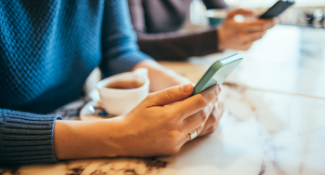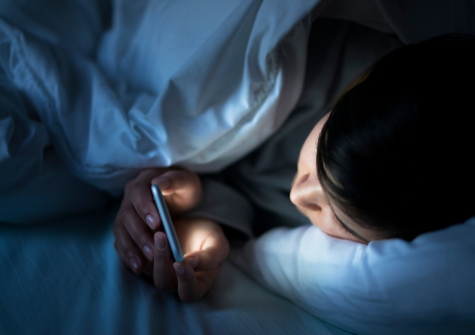
MYTH BUSTED: “Using Electronics Before Bed Doesn’t Affect My Sleep”
Blog written by Kailynn Janaski
DISCLAIMER: THIS WEBSITE DOES NOT PROVIDE MEDICAL ADVICE
The information, including but not limited to, text, graphics, images and other material contained on this website are for informational purposes only. No material on this site is intended to be a substitute for professional medical advice, diagnosis or treatment. Always seek the advice of your physician or other qualified health care provider with any questions you may have regarding a medical condition or treatment and before undertaking a new health care regimen, and never disregard professional medical advice or delay in seeking it because of something you have read on this website.

As technology continues to develop and be used all around us, it’s easy to see the positive influences it has had on daily life. New technologies may bring many benefits, but there are also some negative consequences as well. Many people sit in front of their screens, not realizing the effect it can have on their bodies (especially before bed). Exposing your body to unnatural things, such as screens before bed, can drastically affect your sleep. That’s why we’re taking the time to tell you that using electronics before bed not only affects your sleep, but can also cause long-lasting consequences. MYTH BUSTED.



Sleep Matters
After a long and tiring day, nothing feels better than finally being able to jump into bed and relax – it’s one of the best feelings in the world. Sleep is an essential and necessary part of our health and wellbeing. During this time, our bodies and minds reset and recharge.
Like many of us in today’s world, you may find yourself turning to technology to distract your mind from the hustle and bustle of life. We use our phones to track everything – from keeping in touch with friends and family to checking the score of last night’s game to looking at the weather for the next few days. It’s no wonder many people experience trouble sleeping and waking up not feeling rested.



It Starts with Screens
The continuous development of technology has allowed screens to advance drastically. Today, screen quality is one of the biggest selling points of any new technology. Companies that are trying to get ahead of their competitors have the goal of being able to provide consumers with sharper, more realistic images.
And although the ability to experience the growth and advancements of technology is quite a luxury, being constantly stimulated by our screens may be doing more harm than good to our sleep cycles.

The Negative Consequences
Dr. Michael Breus, a clinical psychologist and diplomate of the American Board of Sleep Medicine, wrote this article about technology and sleep. In the article, he brings up how technology interferes with circadian rhythm. The National Cancer Institute defines here that circadian rhythm is, “the natural cycle of physical, mental, and behavior changes that the body goes through in a 24-hour cycle.”

The National Cancer Institute explains further that circadian rhythms are, “mostly affected by light and darkness and are controlled by a small area in the middle of the brain.” They also add, “circadian rhythm is sometimes called the body’s clock.”
In his article, Dr. Michael Breus says that our circadian rhythm is what allows our bodies to wake and sleep based on our natural cycle. Electronics such as cell phones, computers, e-readers, and tablets emit sound and “blue light” creating a stimulating effect on the brain.
Along with fluorescent and LED lights, blue light can directly affect eyesight. SleepFoundation.org has this article that discusses how electronics affect sleep. The article talks about how blue light emits short-wavelength enriched light, increasing the stimulation of the brain and affecting the production of melatonin in the body. The article continues, saying that from exposure to blue light and stimulation, we interrupt our circadian rhythm and disrupt our bodies ability to produce this necessary chemical, making it harder for our minds to rest and fall asleep. It can also affect the amount of time spent in “slow-wave” and “rapid-eye-movement” (REM) sleep. These are both necessary components of our sleep cycle and vital for cognitive functioning.
This article published in Nature Neuroscience, a monthly multidisciplinary journal that publishes neuroscience research from all area of the field, says that failure to obtain quality sleep can result in issues regarding memory, emotions and physical health.


Changes to Make
To help offset the exposure of these outside factors, many experts suggest to dim lights from electronic devices as much as possible before bed. Luckily, many electronics today come with “night mode,” making them better equipped to be used at night.

This article published by the National Center for Biotechnology Information (NCBI) addresses the “night mode” of electronic devices. The article says that the warm colors used when night mode is switched on decrease the exposure to blue light, making it easier to fall asleep when using a device compared to its regular display.
Not only can exposure to blue light affect sleep quality, but it can also cause eye strain. The article published by NCBI says using night mode can drastically reduce the contrast on the screen, reducing symptoms of eye strain.
Even better than reducing screen brightness and blue light, this article by SCL Health, a health system composed of 8 hospitals and more than 100 clinics, cites the National Sleep Foundation‘s recommendation to stop using all electronics at least 30 minutes before bed. These changes can help you fall asleep faster and improve your quality of sleep, leading to feeling more rested the next day.


Did you find this post helpful and informative? If you did, let us know — hit the ‘Like’ button or click the buttons below to share this post on Facebook, Twitter, or LinkedIn, or save it to your Pinterest board!
You can also share your thoughts with us by leaving a reply at the bottom of this page. And be sure to take a look at our other blog posts here!
Check out our Contact Us page for our info.
References
Breus, M. (2022, June 27). Technology’s Impact on Sleep: Screen Time, Blue Light, and More – The Sleep Doctor. The Sleep Doctor. https://thesleepdoctor.com/technology/
Can Electronics Affect Quality Sleep? | Sleep Foundation. (2017, July 27). Sleep Foundation. https://www.sleepfoundation.org/how-sleep-works/how-electronics-affect-sleep
Does the iPad Night Shift mode reduce melatonin suppression? – PubMed. (n.d.). PubMed. Retrieved July 5, 2022, from https://pubmed.ncbi.nlm.nih.gov/31191118/
MYTH-BUSTING | definition in the Cambridge English Dictionary. (n.d.). Cambridge Dictionary | English Dictionary, Translations & Thesaurus. Retrieved July 1, 2022, from https://dictionary.cambridge.org/us/dictionary/english/myth-busting
NCI Dictionary of Cancer terms. National Cancer Institute. (n.d.). Retrieved from https://www.cancer.gov/publications/dictionaries/cancer-terms/def/circadian-rhythm
Sleep on it! | Nature Neuroscience. (n.d.). Nature; Springer Nature. Retrieved July 5, 2022, from https://www.nature.com/articles/nn1200_1235
Why It’s Time to Ditch the Phone Before Bed | SCL Health. (n.d.). SCL Health | Healthcare in Colorado, Montana and Kansas. Retrieved July 5, 2022, from https://www.sclhealth.org/blog/2019/09/why-it-is-time-to-ditch-the-phone-before-bed/#:~:text=Tips%3A,and%20start%20reading%20before%20bed




